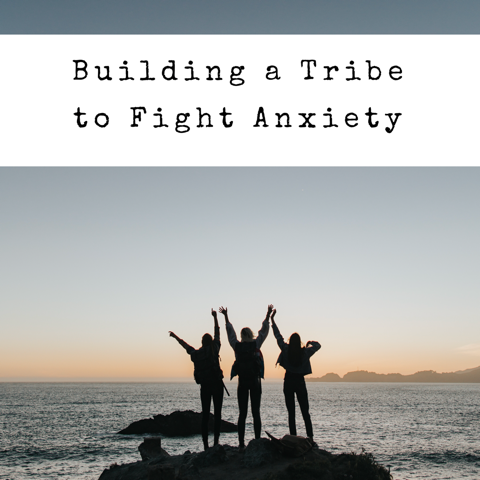
Building a Tribe to Fight Anxiety
Are you a college freshman, transfer, or even returning student? As the time draws closer, does your mind start bombarding you with negative thoughts and doubts?
First, know that you are not alone. Many students feel this way and experience similar symptoms. It is human nature to fear the unknown, but it is also human nature to overcome our fears in order to embrace the unknown. While it may be daunting, the beginning of each school year is an opportunity to press the internal reset button, offering a fresh start. It signals a time of hope, renewal, and growth. So, how do we break through our anxiety, which limits us, in order to experience this sense of expansion?
Building social support in any situation is vital for emotional health. Research has documented its many physiological and mental health benefits. It strengthens the immune system, decreases anxiety and depression, and acts as a buffer for stress. We create our social support network by forming relationships with people whose words and actions communicate that they care about us, who validate our feelings and help us cope with problems to the best of their ability: by providing information, assistance, or resources. Simply put, we require healthy friends, acquaintances, and mentors in our lives. We need a tribe!
That all sounds great, but how do we go about creating this social support network? Many of us struggle to meet new people, make friends, and form relationships. Based on past experiences of pain or rejection, we have developed defense mechanisms, which make us shy, anxious, guarded, and great avoiders. Talking to strangers doesn’t come easy to us; even the idea of it can cause stress. Understand, though, that stress is a natural part of life, and working through our discomfort often leads to greater growth, to a more meaningful life. But first we must be brave, put aside our fears, and take a risk.
Following are three ways to help you step outside your comfort zone to start building your own tribe. They may sound simple, but approaching another person can be challenging if you remain rooted in your own fear. To counter this feeling, turn your mind to uplifting thoughts, remind yourself of your positive attributes: I am kind, funny, a great friend, a problem solver.
1) Make an effort
Talk to other people first. For example, if you see another student moving into your dorm, ask if you can carry something. When you’re walking to campus, invite your neighbor to join you. Driving into town or running errands? See if your roommate needs anything or would like to ride along.
2) Focus on similar interests
What do you like to do? If you’re into sports, join the swim team, hang around the basketball court and ask if you can join in, sign up as a double to play tennis. If you make your own jewelry or clothing and notice a unique piece on someone else, compliment them on it. Look people in the eye in passing, smile, and say hello; ask your classmates questions; be open and available to others. And remember, it takes time to develop a friendship.
3) Volunteer
Get involved with your community. Most universities and colleges offer many opportunities for philanthropic work. This is a great way to build your resume and your social circle! Visit the volunteer office at your school and schedule an appointment with an advisor to find the right fit for you: hospitals, food banks, beach clean up. Giving back feels good and is a wonderful way to develop meaningful relationships.
Creating a network, a tribe, has been proven to reduce the symptoms of anxiety. Humans need healthy social supports, not just to survive, but to live a fuller, more meaningful life. What’s exciting about this, and empowering, is that while we can’t control every aspect of our lives, building our own tribe is completely up to us. We get to choose. So choose carefully. Surround yourself with people whom you truly care about and who care about you, people with positive energy who lift you up and make you feel both supported and happy.
Remember, feelings are temporary; your initial discomfort won’t last. Take small, manageable steps, and give yourself credit for each successful outcome, no matter how small. They all count!
We’d love to hear from you. Please send us a message with any comments or questions.

